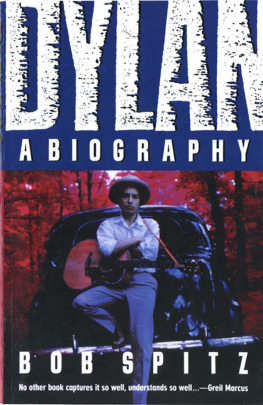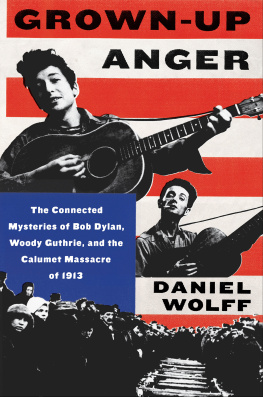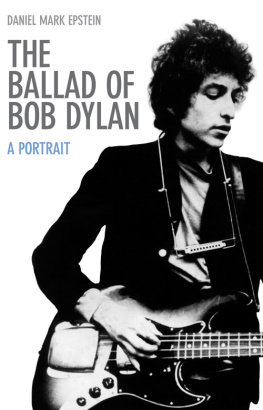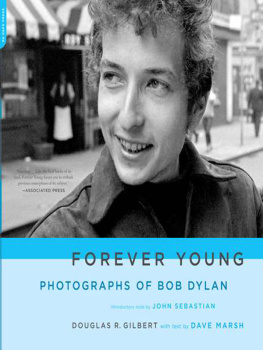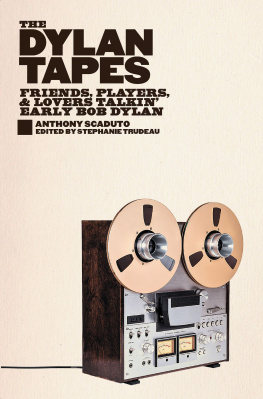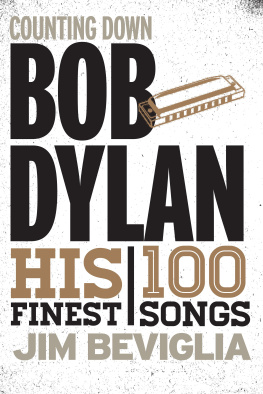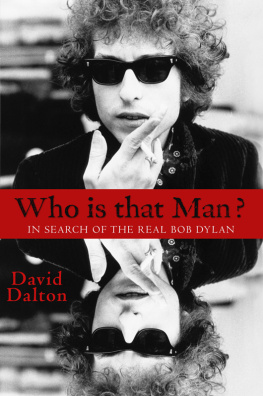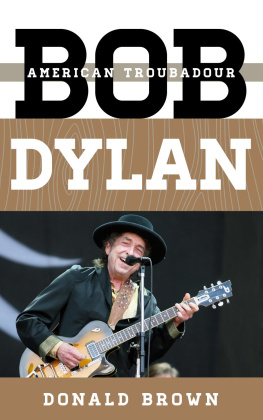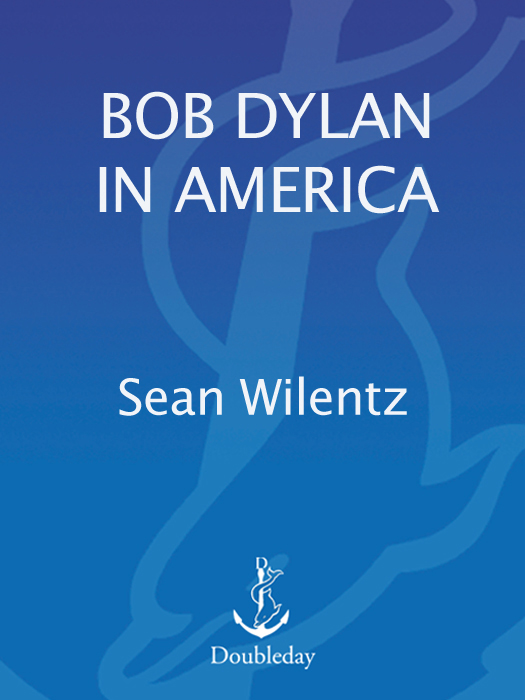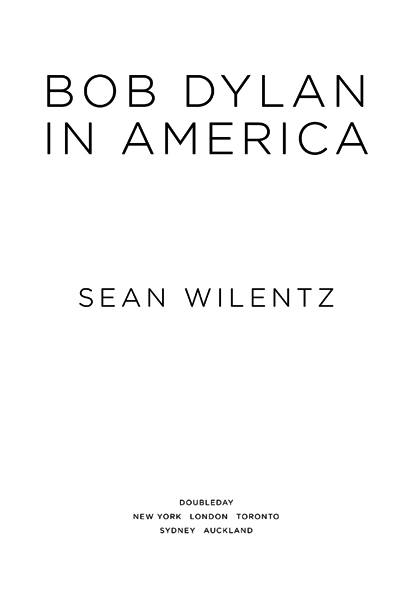Also by Sean Wilentz
The Age of Reagan: A History, 19742008
The Rise of American Democracy: Jefferson to Lincoln
Andrew Jackson
The Rose and the Briar:
Death, Love, and Liberty in the American Ballad (ed., with Greil Marcus)
The Kingdom of Matthias (with Paul E. Johnson)
The Key of Liberty:
The Life and Democratic Writings of William Manning, A Laborer, 17471814 (with Michael Merrill)
Chants Democratic:
New York City and the Rise of the American Working Class, 17881850
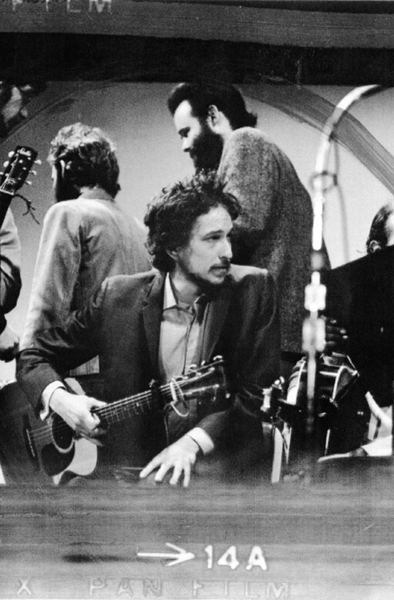

DOUBLEDAY
Copyright 2010 by Sean Wilentz
All rights reserved. Published in the United States by Doubleday, a division of Random House, Inc., New York, and in Canada by Random House of Canada Limited, Toronto.
www.doubleday.com
DOUBLEDAY and the DD colophon are registered trademarks of Random House, Inc.
Portions of this work previously appeared in slightly different form in the following: www.bobdylan.com; The Bridge; The Daily Beast; The Oxford American; A New Literary History of America, edited by Greil Marcus and Werner Sollors (Cambridge, Mass.: Belknap Press of Harvard University Press, 2009); The Rose and the Briar: Death, Love, and Liberty in the American Ballad, edited by Sean Wilentz and Greil Marcus (New York: W. W. Norton and Company, 2005); and as liner notes for The Bootleg Series Volume 6: Bob Dylan Live 1964, Concert at Philharmonic Hall and Bob Dylan Live at the Gaslight 1962.
Grateful acknowledgment is made to Ginsberg, LLC, for permission to excerpt from Wichita Vortex Sutra by Allen Ginsberg and to Special Rider Music for permission to reprint the following: excerpts from Absolutely Sweet Marie by Bob Dylan, copyright 1966 and renewed 1994 by Dwarf Music; excerpt from Blind Willie McTell by Bob Dylan (as sung on version released on Bootleg Series Vols. 13), copyright 1983 by Special Rider Music; excerpt from liner notes by Bob Dylan from Bringing It All Back Home, copyright 1965 by Bob Dylan; excerpts from Bye and Bye by Bob Dylan, copyright 2001 by Special Rider Music; excerpt from Chimes of Freedom by Bob Dylan (from unpublished poetry manuscripts, late 1963early 1964), copyright 1964 by Warner Bros. Inc. and renewed 1992 by Special Rider Music; excerpts from Cry a While by Bob Dylan, copyright 2001 by Special Rider Music; excerpts from Delia by Bob Dylan (as sung on version released on World Gone Wrong), copyright 1993 by Special Rider Music; excerpt from Dusty Old Fairgrounds by Bob Dylan, copyright 1973 by Warner Bros. Inc.; excerpt from For Dave Glover by Bob Dylan; excerpt from Highway 61 Revisited by Bob Dylan, copyright 1965 and renewed 1993 by Special Rider Music; excerpt from Hurricane by Bob Dylan and Jacques Levy, copyright 1975 by Rams Horn Music; excerpt from I Shall Be Free No. 10 by Bob Dylan, copyright 1964 and renewed 1992 by Special Rider Music; excerpt from Just Like a Woman by Bob Dylan, copyright 1966 and renewed 1994 by Dwarf Music; excerpt from Lonesome Day Blues by Bob Dylan, copyright 2001 by Special Rider Music; excerpt from Moonlight by Bob Dylan, copyright 2001 by Special Rider Music; excerpts from Nettie Moore by Bob Dylan, copyright 2006 by Special Rider Music; excerpt from Visions of Johanna by Bob Dylan, copyright 1966 and renewed 1994 by Dwarf Music; excerpt from Advice for Geraldine on Her Miscellaneous Birthday from Writings and Drawings by Bob Dylan, copyright 1964 by Bob Dylan (New York: Alfred A. Knopf, Inc., 1973). Reprinted by permission of Special Rider Music.
Library of Congress Cataloging-in-Publication Data
Wilentz, Sean.
Bob Dylan in America / Sean Wilentz.1st ed.
p. cm.
1. Dylan, Bob, 19412. SingersUnited StatesBiography. I. Title.
ML420.D98W53 2010
782.42164092dc22
[B] 2009047636
eISBN: 978-0-385-52989-1
Frontispiece: Bob Dylan with, at rear, left to right, Robbie Robertson, Levon Helm, and Garth Hudson, at the Woody Guthrie Memorial Concert, Carnegie Hall, New York City, January 20, 1968.
v3.1
Only a few hintsa few diffused, faint clues and indirections
Walt Whitman
CONTENTS
INTRODUCTION
F or thirty years I have tried to write about American history, especially the history of American politics. It is extremely hard work, but gratifying over the long haul. Writing historical pieces about American music and about Bob Dylan wouldnt have been in the cards but for a fluke, the result of strange good fortune dating back to my childhood.
While I was growing up in Brooklyn Heights, my family ran the 8th Street Bookshop in Greenwich Village, a place that helped nurture the Beat poets of the 1950s and the folk revivalists of the early 1960s. My father, Elias Wilentz, edited The Beat Scene, one of the earliest anthologies of Beat poetry. Down from the shop, on MacDougal Street, was an epicenter of the folk-music explosion, the Folklore Center, run by my fathers friend Israel Young, whom everyone called Izzy, an outsized enthusiast with an impish grin and a heavy Bronx-Jewish accent. Nothing in that setting was anything I had sought out, or had any idea was going to become important. As things turned out, I was just lucky.
On occasional pleasant Sundays, wed take family strolls that almost always included a stop at the Folklore Center, which was crowded wall to wall with records and stringed instruments and had a little room in the back where musicians hung out. My first memories of Bob Dylan, or at least of hearing his name, are from thereIzzy and my dad would talk about what was happening on the street, and I (a son who wanted to look and act like his father) would eavesdrop. Only much later did I learn that Dylan first met Allen Ginsberg, late in 1963, in my uncles apartment above the bookshop.
A few buildings north of Izzys store, next to the Kettle of Fish bar, a staircase led down into a basement club, where Dylan acquired what it took to make himself a star. The Gaslight Cafe, at 116 MacDougal, was the focal point of a block-long spectacle of hangouts and showcases, including the Caf Wha? (where Dylan played his first shows in the winter of 1961). Down adjoining tiny Minetta Lane, around the bend on Minetta Street, there was another coffeehouse, the Commons, later known as the Fat Black Pussycat. These places, along with the Bitter End and Mills Tavern on far more touristy Bleecker Street, and Gerdes Folk City on West Fourth Street, were Bob Dylans Yale College and his Harvard.
The neighborhood had a distinguished bohemian pedigree. A century before, over on the corner of Bleecker and Broadway, Walt Whitman loafed in a beer cellar called Pfaffs, safe from the gibing mainstream critics, whom he called hooters. A little earlier, a few blocks up MacDougal in a long-gone house on Waverly Place, Anne Charlotte Lynch ran a literary salon that hosted Herman Melville and Margaret Fuller, and where a neighbor, Edgar Allan Poe, first read to an audience his poem The Raven. Eugene ONeill, Edna St. Vincent Millay, e. e. cummings, Maxwell Bodenheim, and Joe Gould, among others, were twentieth-century habitus of MacDougal Street.



